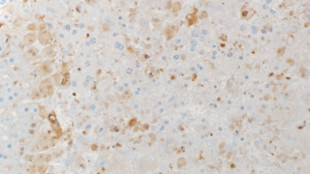 A microscope image of liver tissue from a susceptible mouse infected with Ebola. Caspase cleavage (brown) reflects widespread cell death.ANGELA RASMUSSEN
A microscope image of liver tissue from a susceptible mouse infected with Ebola. Caspase cleavage (brown) reflects widespread cell death.ANGELA RASMUSSEN
Researchers investigating host responses to Ebola have long faced a significant disadvantage: the virus kills conventional lab mice, but does not produce the hemorrhagic fever or other classical symptoms that occur in humans. The lack of a mouse disease model has hampered studies on the pathology and immunology of Ebola infections, as well as the development of treatments.
A team led by Angela Rasmussen and Michael Katze of the University of Washington and Atsushi Okumura of the US National Institutes of Health (NIH) Rocky Mountain Laboratories has tested responses to Ebola in 47 genetically diverse mouse lines, demonstrating considerable variability in disease outcomes. The results, reported today (October 30) in Science, lay the groundwork for analyses of genetic differences in susceptibility to Ebola.
The study ...



















